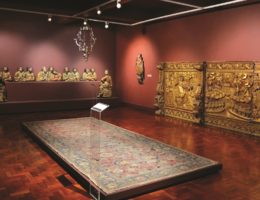
Travel One Portugal est une agence de voyage DMC, hautement qualifiée.
T. +351 291 707 280 Chamada para a rede fixa nacional
Email : portugal@travelone.pt
Localisation (cliquer pour carte)
Lisbonne . Madère . Algarve
MUSEUMS
Enjoying a view to the Tagus river, the National Museum of Ancient Art, in Lisbon, has three reference works from the Age of Discovering and the times of changes lived during the 15th and 16th century: the Saint Vincent Panels, the Triptych of the Temptation of St. Anthony by Bosch and the Custódia de Belém. The Custódia de Belém, a monstrance, was ordered by the king D. Manuel I, using the gold brought by Vasco da Gama in his second travel to India.
In the Convent of Madre de Deus, that once belonged to the Poor Claires, can be found the National Azulejo Museum, where its collections keep the memory of a very Portuguese technique alive (a type of hand painted tiles). One of the most important Azulejo panels in this museum is the Grande Vista de Lisboa (Great View of Lisbon) before the 1755 Lisbon earthquake, which destroyed the city. In this museum still exists a department of conservation and restoration of Azulejo.
In Belém, near the Tagus River, you can find the Electricity Museum. It carries out its activity in the Central Tejo building, a thermoelectric plant that illuminated Lisbon for several decades. The building is an example of the industrial architecture from the beginning of the 20th century. Just because of this factor it would be worthy of a visit, but the venue itself and the location are equally appealing reasons to do it. The museum, nonetheless, is worthwhile for the exhibits and for the guided visits, which start in the outside at the Praça do Carvão (Coal Square). In May the Mês da Ciência (Science Month) takes place in this museum.
With initiative taken by the last queen of Portugal, Dona Amélia, in 1905, the National Coaches Museum in Lisbon has today one of the most important collections of coaches, carriages, sedan chairs, two-wheeled chairs and berliners that helps understanding the evolution of the transportation means until the automobile appeared. Located in Belém, in the old Royal Palace, nowadays it displays the paintings of the Bragança dynasty royalty, the last in Portugal’s throne.








